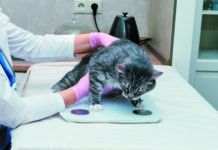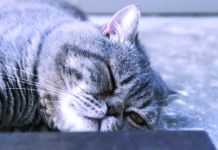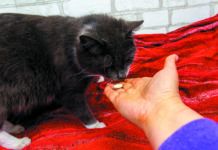

© New Africa | Bigstock
You might think what bothers cat owners when the vet puts their pet on a weight-management plan is the slow rate of weight loss the doctor sometimes recommends. Indeed, cats who should be thinner for their health can lose weight at a very modest rate — from only 0.5 up to a more aggressive 2 percent of body weight per week. For a 20-pound cat who should lose 5 pounds, that means an eating regimen that could result in as little as one tenth of a pound a week.
But while the very gradual drop in pounds does concern some people, what many more cat owners worry about is “how little food their pet actually needs,” says Tufts veterinary nutritionist Deborah Linder, DVM. “It might be just a quarter cup of kibble twice a day depending on how calorie dense the food is. They get particularly anxious when the cat plateaus and I say we need to restrict food intake a little further,” notes Dr. Linder, head of the Tufts Obesity Clinic for Animals. “They’d rather wait out the plateau and have the weight loss take a little longer — they are that concerned about what seems like minuscule portions.”
That’s fine, Dr. Linder says, but she points out that “cats are really good at slowing down their metabolism when you restrict their calorie intake.” Thus, even on a lower-calorie food, there may be a point at which you have to hold back just a little more on portion sizes in order to nudge the needle on the scale downward.
Alternatively, she says, you can get your cat to become more active — moving a light around the floor and walls so he will chase it, providing food puzzles that require action to get the food out, and so on. That will not only burn more calories but also will increase metabolic rate. The more active a cat, the higher his metabolism — and rate of calorie burning — in general.
Dr. Linder comments that whatever tactic you take — restricting food just a tad more or making your pet’s lifestyle more active, or both — it’s important to keep in mind that you’re going for something your cat can live with over the long haul rather than a short-term diet your cat will be able to go “off” once he reaches goal weight. The lifestyle change is forever, she says, which is why it’s fine, even desirable, for the weight to come off slowly.
A Warning For Those In a Weight-Loss Rush
While most people are happy for their cat to lose weight slowly, some want to see quick results. That’s a bad idea. Cats who go without enough food for too long and lose weight too quickly can get fatty liver disease, known medically as hepatic lipidosis. It occurs when the body breaks down fat too quickly and the liver can’t process the fat fast enough. That leads to decreased liver function and, in some cases, even liver failure — which can be fatal if not diagnosed and treated aggressively.
It’s rare for cat owners to restrict their pet’s food to the degree that such a cascade of events would occur, says Dr. Linder. But what she has seen from time to time is a cat prescribed a new brand of calorie-controlled food that he doesn’t like and refuses to eat for a long time, putting him at risk for liver disease. “I’d be more comfortable having a standoff with a dog who was refusing his food since they are less at risk for fatty liver problems,” Dr. Linder says. “And a hungry dog will usually come around. We’re always more cautious with cats and may switch the food if they go too long without touching it.”
Owners also have to make sure a cat on a weight-loss plan is not having his food stolen by other cats in the household. That, too, can cause weight loss at a rate that would put his liver at risk.
You can reduce your cat’s risk of fatty liver disease by getting a scale at home to monitor trends in weight loss — anything over 2 percent of your cat’s body weight per week may put him at higher risk (and is more likely to cause muscle loss than fat loss). One scale we have found to have excellent precision (to 0.1 pound) is the Smart Weigh Mother and Baby Digital Bathroom Scale Model SW-MBS10.




